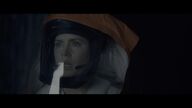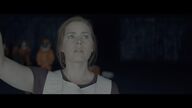The title of the film is 20 minutes before the film. On the helicopter, the hero held a book and read a sentence to the heroine, but because the helicopter was too noisy, the heroine could not hear it clearly. So the male protagonist gestured to remind her to put on the earphones, and read the sentence again. This time, she heard it clearly. He said:
"Language is the cornerstone of civilization and the tool and weapon of communication between civilizations."
This sentence is taken from the preface to the heroine's book. In this episode, the male protagonist uses gestures, voice, and reading text to convey his message to the female protagonist. This seems to imply the limitations of human language.
The male protagonist is an astrophysicist. In addition to spit out a few terms throughout the film, he is mostly the heroine's bodyguard, giving her company and comfort when necessary, and uttering this crucial line. This line corresponds to a detail of the climax of the film. When the alien "heptapod barrel" revealed its meaning, the translated text was "provide weapons", and the heroine argued that "the other meaning of weapons is tools" - "language is tools and weapons". It was later proved that the most important gift of the trip of the Heptapods was their language.
In my opinion, the greatest invention in human history is not the wheel, not the electric light, but language and writing. Language spreads knowledge, allows human beings to understand each other, and allows civilization to be passed on from generation to generation. At the same time, language also creates misunderstandings, sparks conflicts, and even ignites wars. Language is the carrier of ideas, and even if alien civilizations do not touch Earth, it is still a powerful tool and weapon.
Ted Jiang's introduction of the concept of linguistics into science fiction is a great initiative in itself. "Arrival" perfectly preserves the concept of the original work, well imaged, and at the same time extends another ethical proposition: if you already know your future destiny, are you willing to go resolutely without turning back?
Taking it apart, the heroine's act of saving the world is actually time travel. By learning the circular visual language of the alien "septapod", she gained the ability to remember time travel and see her lifelong memories. This experience is similar to the near-death moment described in some works, when past events flood in, like a movie. At this point you should look like Robert De Niro at the end of "Once Upon a Time in America," with only a smile left when he sees the world. But in Ted Jiang's setting, the heroine's life is stored in the hard disk of the brain like past memories, which can be read at any time, but not written.
I can't help but wonder wickedly: If I remember the winning numbers for a future lottery, will I be able to buy them now and be financially free as a result?
Back to topic. The original works have in-depth discussions on science-fiction linguistics and ethical issues. The film deepens and expands the former and simplifies the latter. In the original work, the heroine tried desperately to interfere with her daughter's fate in order to prevent her from dying. As a result, her daughter changed because of her interference and went to the death that was destined to be written. Her intervention and her daughter's death were mutually causal. But the heroine's attitude is to fight actively, like an unyielding teenager, like a praying mantis.
In the movie, only through a few lyrical shots before the end of the movie, the heroine's mentality of accepting the irreversible fate and resolutely moving towards the end point is explained. At this time, her mentality was more like that of an old monk who had entered into meditation, no waves in the ancient well, and silently and completely accepted the arrangement of fate, to enjoy and suffer every moment of life.
The difference between the film and the original book reflects two different values. Just like the myth of Sisyphus written by Camus, people choose two attitudes after facing the absurdity of life. Camus thought Sisyphus was happy. If you knew all the unchangeable fates in the future, how would you choose?
View more about Arrival reviews











